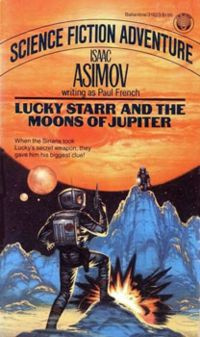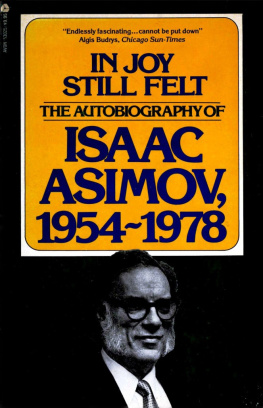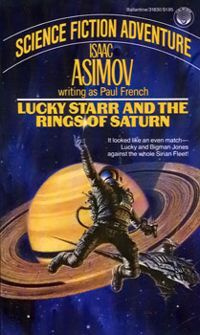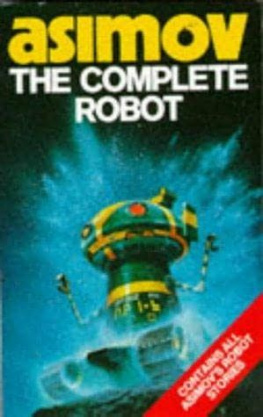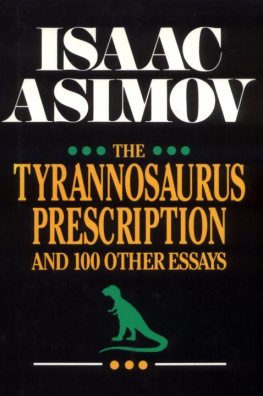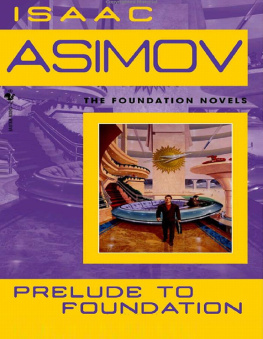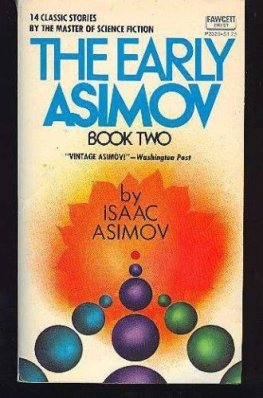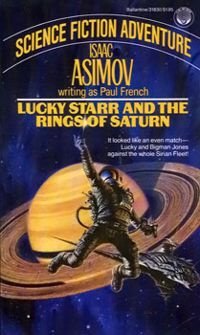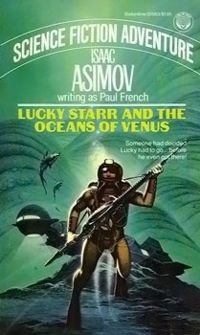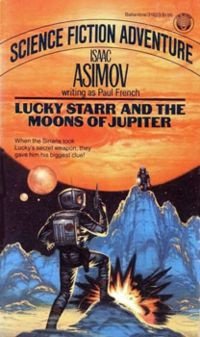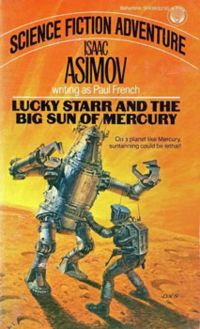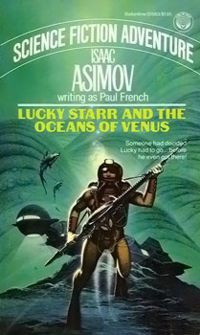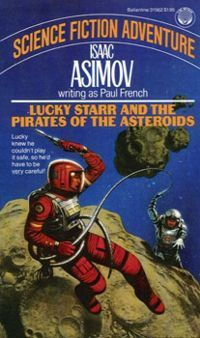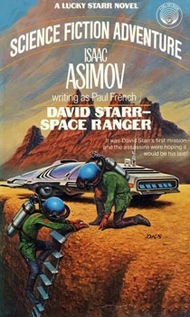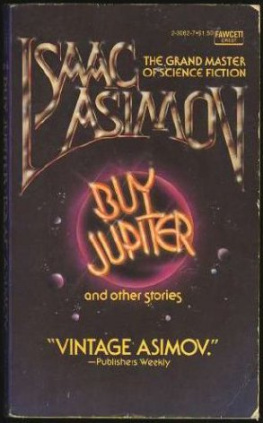Isaac Asimov
Lucky Starr The And The Moons of Jupiter
Preface
Back in the 1950s, I wrote a series of six derring-do novels about David "Lucky" Starr and his battles against malefactors within the Solar System. Each of the six took place in a different region of the system and in each case I made use of the astronomical facts-as they were then known.
Now more than a quarter-century later, these novels are being published in new editions; but what a quarter-century it has been! More has been learned about the worlds of our Solar System in this last quarter-century than in all the thousands of years that went before.
LUCKY STARR: AND THE MOONS OF JUPITER was written in 1956. In late 1973, however, the Jupiter-probe, Pioneer X, passed by Jupiter and recorded an enormous magnetic field containing dense concentrations of charged particles. The large satellites of Jupiter are buried in that field and the intensity of radiation would certainly make it difficult or even impossible for manned ships to maneuver in their neighborhood.
Lucky's trip through the satellite system would have to be adjusted to take the intense radiation into account if I were writing the book today. And in 1974, a 13th satellite of Jupiter, was discovered, a very small one only a few miles across, with an orbit quite similar to that of Jupiter-IX. I'd have mentioned it if I were doing the book now.
I hope my Gentle Readers enjoy the book anyway, as an adventure story, but please don't forget that the advance of science can outdate even the most conscientious science-fiction writer and that my astronomical descriptions are no longer accurate in all respects.
Isaac Asimov
1. Trouble on Jupiter Nine
Jupiter was almost a perfect circle of creamy light, half the apparent diameter of the moon as seen from Earth, but only one seventh as brightly lit because of its great distance from the sun. Even so, it was a beautiful and impressive sight.
Lucky Starr gazed at it thoughtfully. The lights in the control room were out and Jupiter was centered on the visiplate, its dim light making Lucky and his companion something more than mere shadows. Lucky said, "If Jupiter were hollow, Bigman, you could dump thirteen hundred planets the size of Earth into it and still not quite fill it up. It weighs more than all the other planets put together."
John Bigman Jones, who allowed no one to call him anything but Bigman, and who was five feet two inches tall if he stretched a little, disapproved of anything that was big, except Lucky. He said, "And what good is all of it? No one can land on it. No one can come near it."
"We'll never land on it, perhaps," said Lucky, "but we'll be coming close to it once the Agrav ships are developed."
"With the Sirians on the job," said Bigman, scowling in the gloom, "it's going to take ms to make sure that happens."
"Well, Bigman, we'll see."
Bigman pounded his small right fist into the open palm of his other hand. "Sands of Mars, Lucky, how long do we have to wait here?"
They were in Lucky's ship, the Shooting Starr, which was in an orbit about Jupiter, having matched velocities with Jupiter Nine, the giant planet's outermost satellite of any size.
That satellite hung stationary a thousand miles away. Officially, its name was Adrastea, but except for the largest and closest, Jupiter's satellites were more popularly known by numbers. Jupiter Nine was only eighty-nine miles in diameter, merely an asteroid, really, but it looked larger than distant Jupiter, fifteen million miles away. The satellite was a craggy rock, gray and forbidding in the sun's weak light, and scarcely worth interest. Both Lucky and Bigman had seen a hundred such sights in the asteroid belt.
In one way, however, it was different. Under its skin a thousand men and billions of dollars labored to produce ships that would be immune to the effects of gravity.
Nevertheless, Lucky preferred watching Jupiter. Even at its present distance from the ship (actually three fifths of the distance of Venus from Earth at then closest approach), Jupiter showed a disc large enough to reveal its colored zones to the naked eye. They showed in fault pink and greenish-blue, as though a child had dipped Ms fingers in a watery paint and trailed them across Jupiter's image
Lucky almost forgot the deadliness of Jupiter in its beauty. Bigman had to repeat his question in a louder voice.
"Hey, Lucky, how long do we have to wait here?"
"You know the answer to that, Bigman. Until Commander Donahue comes to pick us up."
"I know that part. What I want to know is why we have to wait for him."
"Because he's asked us to."
"Oh, he has. Who does the cobber think he is?"
"The head of the Agrav project," Lucky said patiently.
"You don't have to do what he says, you know, even if he is."
Bigman had a sharp and deep realization of Lucky's powers. As full member of the Council of Science, that selfless and brilliant organization that fought the enemies of Earth within and without the solar system, Lucky Starr could write his own ticket even against the most high-ranking.
But Lucky was not quite ready to do that. Jupiter was a known danger, a planet of poison and unbearable gravity; but the situation on Jupiter Nine was more dangerous still because the exact points of danger were unknown-and until Lucky could know a bit more, he was picking his way forward carefully.
"Be patient, Bigman," he said.
Bigman grumbled and flipped the lights on. "We're not staring at Jupiter all day, are we?"
He walked over to the small Venusian creature bobbing up and down in its enclosed water-filled cage in the corner of the pilot room. He peered fondly down at it, his wide mouth grinning with pleasure. The V-frog always had that effect on Bigman, or indeed, on anyone.
a tiny thing that seemed, at times, all eyes and feet. Its body was green and froglike and but six inches long. His twa big eyes protruded like gleaming blackberries, and its sharp, strongly curved beak opened and closed at irregular intervals. At the moment its six legs were retracted, so that the V-frog hugged the bottom of its cage, but when Bigman tapped the top cover, they unfolded like a carpenter's rule and became stilts. ^
It was an ugly little thing but Bigman loved it when he was near it. He couldn't help it. Anyone else would feel the same. The V-frog saw to that.
Carefully Bigman checked the carbon-dioxide cylinder that kept the V-frog's water well saturated and healthful and made sure that the water temperature in the cage was at ninety-five. (The warm oceans of Venus were bathed by and saturated with an atmosphere of nitrogen and carbon dioxide. Free oxygen, nonexistent on Venus except in the man-made domed cities at the bottom of its ocean shallows, would have been most uncomfortable for the V-frog.)
Bigman said, "Do you think the weed supply is enough?" and as though the V-frog heard the remark, its beak snipped a green tendril off the native Venusian weed that spread through the cage, and chewed slowly.
Lucky said, "It will hold till we land on Jupiter Nine," and then both men looked up sharply as the receiving signal sounded its unmistakable rasp.
A stern, aging face was centered on the visiplate after Lucky's fingers had quickly made the necessary adjustments.
"Donahue at this end," said a voice briskly.
"Yes, Commander," said Lucky. "We've been waiting for you."
"Clear locks for tube attachment, then."
On the commander's face, written in an expression as clear as though it consisted of letters the size of Class I meteors, was worry-trouble and worry.
Next page
